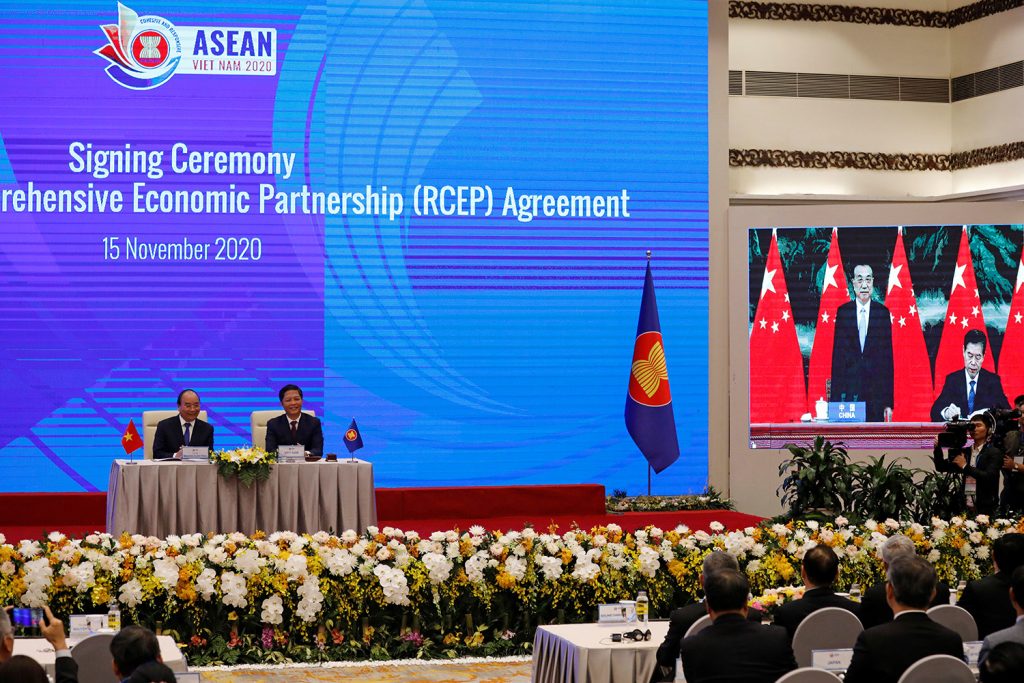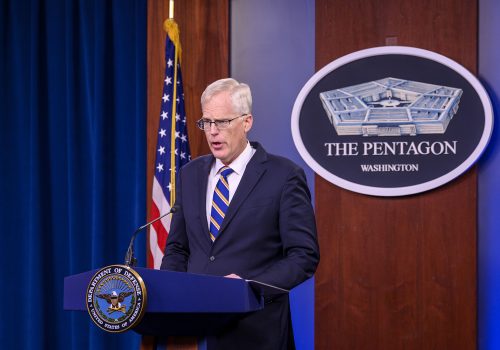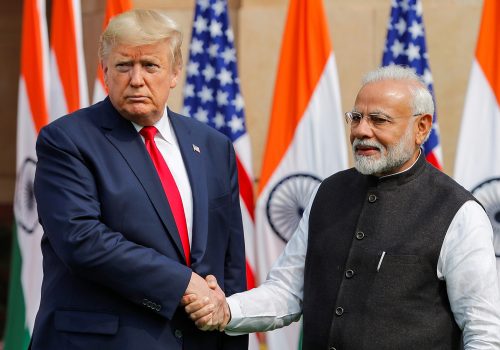Woody Allen once famously said, “Eighty percent of success is showing up.” No advice is more important for President-elect Joe Biden as he maps his strategy to regain the United States’ lost ground and influence around the world.
The trend of relative US global retreat pre-dated the Trump administration, but it accelerated in the past four years. The Biden administration has made as one of its top priorities the reinvigoration of common cause alongside global partners and allies. Reversing current trends, however, needs to begin with an understanding of where US “no-shows” have been most significant.
This week’s announcement of the Regional Comprehensive Economic Partnership (RCEP) would be a good place to start. China stood at the center—and the United States watched from the distant sidelines—of the world’s largest-ever multilateral trade agreement. It brings together countries that account for roughly 30 percent of the world’s economic output and population.
Get the Inflection Points newsletter
Subscribe to Frederick Kempe’s weekly Inflection Points column, which focuses on the global challenges facing the United States and how to best address them.
The deal is a fitting bookend for a Trump administration that in its first hours pulled out of negotiations toward a Trans-Pacific Partnership agreement that would have sealed America’s trade ties with eleven other Asian economies, stealing a march on China. Instead, that agreement went ahead among those countries—but without the United States. The Biden administration should begin by studying whether there is an accelerated path to rejoining this group.
Yet the phenomenon of relative US withdrawal, known by some scholars as “world without US,” goes far beyond trade. Last week, for example, both the United States and Europe were left on the outside looking in as Russia brokered an agreement ending six weeks of bloody conflict between Azerbaijan and Armenia in the disputed region of Nagorno-Karabakh.
Whatever one’s view of the agreement—the Armenians appear to have lost the most as matters stand—what struck international diplomats was President Vladimir Putin’s central and unchallenged role. Turkey was the only other major country involved, but it wasn’t a signatory to the agreement nor is it mentioned in the deal. That said, Ankara’s military and diplomatic support contributed to Azerbaijan’s victory.
Putin’s message to Europe and the world was clear at a time of American political transition and distraction: the United States is no longer a decisive factor in “his region.”
“Missing this opportunity and allowing Moscow full rein over how the war ended means Russia now sits with military bases on the territory of all three South Caucasus republics,” writes Neil Hauer, a Canadian journalist and analyst working from the South Caucasus. “Any US engagement with Karabakh (under a Biden administration) will thus now start firmly on the back foot, beholden to this unfavorable reality on the ground.”
American diplomats who have invested their careers in the democratic and peaceful development of countries on Russia’s borders note the stark contrast between waning US influence now and Washington’s central role twenty-five years ago, when it brokered the Dayton Accords that ended the Bosnian war.
Many Americans may welcome less engagement in such distant conflicts, even when they don’t involve US troops. However, the impression left among allies and adversaries around the world is that Washington has quietly accepted a diminished global role of uncertain shape and ambition.
They point to the recent Abraham Accords, through which the United Arab Emirates and Bahrain reached peace agreements with Israel, to underscore how much Washington can still shape a better future when it wishes. However, even there the parties moved forward partly as a security hedge against growing concerns regarding reduced American presence.
The list is a long one of places where partners will want the Biden administration to reassert US influence. The new president is likely to rejoin the Paris climate agreement and the World Health Organization on inauguration day, but he will move forward on other fronts as well.
First up, US partners will be watching to see if President Biden works more closely in multilateral settings such as the G-7 and the G-20 to better manage global common cause in response to COVID-19, vaccine distribution and ongoing economic shocks. They point to the way America responded to the 2008-2009 global financial crisis as an example of just such leadership.
They’ll also watch to see how quickly and with what success the United States will re-engage multilateral organizations like the United Nations. Whatever Americans may think of the UN’s performance, US disengagement has left the door open for China to fill top positions across a number of the most influential UN agencies. China now heads four of the fifteen specialized UN agencies and groups that run the organization’s machinery. No other country has more than one.
Most important, but also most difficult politically, will be addressing Chinese global economic and trade gains of the sort that this week’s RCEP agreement signifies.
Nowhere could the United States gain more ground more quickly than in forging trade and investment agreements with its European and Asian partners, either by joining current agreements or creating new ones.
What RCEP shows is that China and some of Washington’s closest regional partners see that the fastest route to greater prosperity is through trade and liberalizing economic relations. The agreement is expected to add $209 billion to global incomes and $500 billion to global trade by 2030.
That said, both Democratic and Republican members of Congress and their constituencies have grown wary of just the sort of agreements that are most crucial in addressing China’s rise.
Manfred Weber, the leader of the European People’s Party, the largest constituency in the European parliament, told the South China Morning Post that the new Asia-Pacific trade deal should be a “wake-up call” for transatlantic common cause.
“We need a reunification of the so-called Western world,” he said, “now with Joe Biden as a constructive partner, to face this challenge of China. It’s the key question for the upcoming decade.”
Coming back to Woody Allen, 80 percent of success might be showing up, but it’s the final 20 percent that will be decisive to history. Can President-elect Biden galvanize European and Asian partners around a historic agreement to counter the growing influence of China and authoritarian capitalism? Or will US politics and disarray among global democracies block this crucial path to global relevance?
This article originally appeared on CNBC.com
Frederick Kempe is president and chief executive officer of the Atlantic Council. You can follow him on Twitter @FredKempe.
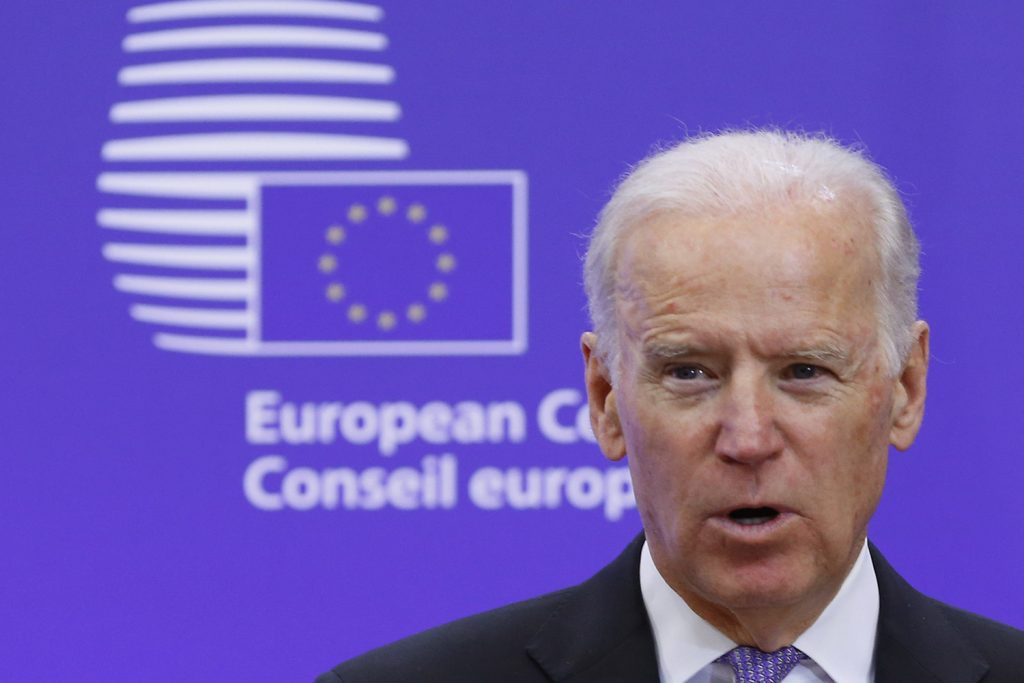
THE WEEK’S TOP READS
Atlantic Council experts provide President-elect Biden concrete ideas for a “new transatlantic deal” and how to rejoin an Asian trade agreement.
The State Department’s Policy and Planning department releases a must-read, 70-page paper on “the Elements of the Chinese Challenge.”
Uri Friedman, the Atlantic Council’s managing editor, explores in The Atlantic why resilience has become a new measure of national power. CNN’s Fareed Zakaria makes an appeal, in excerpts from his new book, for Americans to rediscover idealism.
Finally, visit Rehoboth Beach with the Wall Street Journal, the down-to-earth home of the Biden retreat.
#1. WHERE BIDEN COULD START IN EUROPE AND ASIA
Biden Knows Europe, and Europe Knows Biden. That’s Not Enough.
Daniel Fried and Benjamin Haddad / FOREIGN POLICY
A gaping hole in US Indo-Pacific strategy
Robert A. Manning / THE HILL
Atlantic Council experts provide two excellent ways President-elect Biden could deliver on his pledge to rally global democracies to meet the Chinese challenge, one in Europe and the other in Asia.
Dan Fried and Ben Haddad, writing in Foreign Policy, call for “a new trans-Atlantic deal” that would have Biden, “the most pro-European US president since George H.W. Bush,” embrace a more self-assertive Europe.
They envision a transatlantic action plan among NATO and EU member countries in President Biden’s first year that would create common cause to address coronavirus, climate change, Russia, China, defense, dark money, and digital regulation. Read More →
Writing in The Hill, Bob Manning lays out a convincing argument that the best US response to this week’s announcement of the world’s largest trade agreement, the RCEP, would be for it to rejoin the Trans-Pacific Partnership agreement that Trump abandoned in his administration’s first hours. President-elect Biden has said he would consider it.
The major obstacle, writes Manning, is that “US officialdom shuns trade like Typhoid Mary.” Read More →
#2. BIDEN’S CHINA CHALLENGE
The China strategy America needs
ECONOMIST
The Elements of the China Challenge
Office of Policy Planning / US Department of State
One of the biggest mistakes almost every new US administration makes is a knee-jerk desire to discard whatever its predecessor has done. That would be particularly mistaken when it comes to dealing with China.
“The achievement of the Trump administration was to recognize the authoritarian threat from China,” writes the Economist. “The task of the Biden administration will be to work out what to do about it.” Read More →
The Biden team should read closely a State Department paper released this week by its policy planning team, entitled “The Elements of the China Challenge.” I’ve read nothing better, inspired as it is by the 1947 essay on Russia, written by the policy planning team’s founder, George Kennan.
“The document,” writes Axios, “which is more than seventy pages long, examines the Chinese Communist Party’s harmful conduct and its ideological sources, the vulnerabilities China faces, and how the US and its allies should respond.” Read More →
#3. THE POWER OF RESILIENCE
The Pandemic Is Revealing a New Form of National Power
Uri Friedman / THE ATLANTIC
Uri Friedman, the Atlantic Council’s managing editor, reflects on the sort of national power the COVID-19 era requires.
“Each geopolitical age places a premium on particular forms of national power,” writes Friedman. Today’s defining global challenge is the pandemic. In response to this, a country’s most valuable source of power has become resilience, he asserts. Friedman defines it as the “capacity to absorb systemic shocks, adapt to these disruptions, and quickly bounce back from them.”
By that measure, the United States has failed thus far. However, Friedman believes America is still well-positioned to adapt to a new set of realities and retain its global standing.
“That,” he writes, “will require the government recognizing that human security is national security; that societal resilience is a modern form of deterrence against new types of non-military aggression by adversaries; that investing in more redundancy and contingency planning is a prudent hedge against future risks, even at some cost to efficiency; and that military power isn’t all-powerful.” Read More →
#4. THE POWER OF IDEALISM
The World Needs American Idealism Again
Fareed Zakaria / THE WALL STREET JOURNAL
Fareed Zakaria, long one of my favorite commentators on international affairs, delivers a must-read appeal in the weekend WSJ for the United States to rediscover the idealism that made it great after World War II.
He writes that our current pandemic doesn’t come close to the challenges US leaders confronted in the period between 1914 and 1945, which brought two world wars and a series of catastrophes that left more than 150 million dead.
“We have enjoyed the fruits of their labor: 75 years of relative peace,” he writes. “But as a result, we have become cynics, contemptuous of the idealism that got us to where we are. The statesmen who led the Allied countries through war and depression knew better and resolved to give idealism a chance.”
Fareed’s essay is adapted from his new book, “Ten Lessons for a Post-Pandemic World.” I just ordered my copy. Read More →
#5. REHOBOTH’S MOMENT
Brace for Traffic and Tacky Souvenirs: Rehoboth Just Became a Presidential Retreat
Julie Bykowicz / THE WALL STREET JOURNAL
By pure coincidence, my family rented a place in August that was a short stroll from President-elect Biden’s beach house at Rehoboth, Delaware. Following the Democratic convention that nominated Biden, our daughter had her first introduction to Secret Service agents at roadblocks, who were every bit as friendly as the biking Bidens themselves.
In the great tradition of the Wall Street Journal’s lighter page-one features, Julie Bykowicz takes an early look at how the Biden’s Rehoboth will stack up against Trump’s Palm Beach, the Obama’s Martha’s Vineyard, the Bush’s Kennebunkport, and the Kennedy’s Hyannis Port.
As it is with the Bidens themselves, Rehoboth is more down-to-earth, which isn’t likely to change much despite the tourist swarms that will now line up at Egg, a favored Biden breakfast spot, the Italian joints where he dines, or the St. Edmond Roman Catholic Church where he worships when he’s in town. Read More →
QUOTE OF THE WEEK
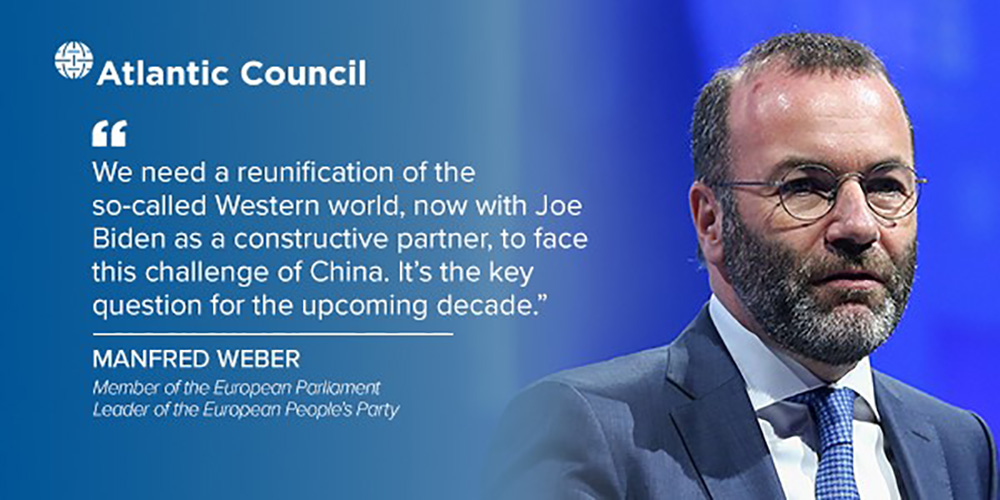
Atlantic Council Top Reads
Image: Vietnam's Prime Minister Nguyen Xuan Phuc (L) sits next to Minister of Industry and Trade Tran Tuan Anh as they watch a screen showing Chinese Minister of Commerce Zhong Shan (R) signing next to Chinese Premier Li Keqiang during the virtual signing ceremony of the Regional Comprehensive Economic Partnership (RCEP) Agreement during the 37th ASEAN Summit in Hanoi, Vietnam November 15, 2020. REUTERS/Kham
